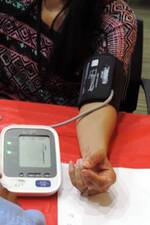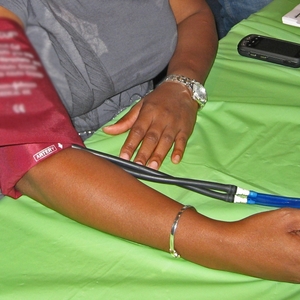MedicalResearch.com Interview with:
Michael J. LaMonte, PhD, MPH
Research Professor (epidemiology)
Department of Epidemiology and Environmental Health
School of Public Health and Health Professions
Women’s Health Initiative Northeast Regional Center
University at Buffalo – SUNY
Buffalo, NY 14214
MedicalResearch.com: What is the background for this study? What are the main findings?
Dr. LaMonte: The rationale for this study was based on existing study results showing
- (1) oral bacteria are involved with conversion of dietary nitrate (e.g., from leafy greens and beets) to nitric oxide which is a chemical involved keeping arteries healthy and maintaining blood pressure;
- (2) rinsing the mouth with antiseptic solution (mouthwash) kills oral bacteria and results in rapid increases in systolic and diastolic blood pressure; and
- (3) a very limited amount of epidemiological data suggest that the oral bacteria found beneath the gums (responsible for gingivitis and periodontal disease) are associated with blood pressure and history of hypertension in middle-aged adults.
Thus, we conducted our study to determine whether oral bacteria (beneath the gums) would be predictive of developing hypertension among women who were without this condition at the time the bacteria were measured. Because the bacteria (exposure) would be known to precede development of hypertension (disease), an association seen in our study would be strongly suggestive of a role for oral bacteria in the development of high blood pressure.
Our primary result was for statistically significant higher risks of developing hypertension associated with 10 bacterial species, and significantly lower risks of developing hypertension associated with 5 bacterial species. Our findings were evident even after we accounted for differences in demographic factors, lifestyle factors, and clinical factors, and generally were of consistent magnitudes we examined across subgroups of older and younger women, white and black women, normal weight and overweight/obese women, those with normal or slightly elevated blood pressure at study enrollment, and those who were using or not using menopausal hormone therapy at baseline. Therefore, while our observational study evidence for an association is not equivalent to causation, the robustness of the associations between oral bacteria and hypertension risk supports a need to further understand this relationship, ideally with a clinical trial design that would provide definitive evidence to support or refute causation.
(more…)





 It is your lifestyle that determines your blood pressure levels. Your nutritional intake and the level of activity have a significant part as well.
It is your lifestyle that determines your blood pressure levels. Your nutritional intake and the level of activity have a significant part as well. 
 Esa M. Davis, M.D., M.P.H , F.A.A.F.P
Professor of Medicine and Family and Community Medicine
Associate Vice President of Community Health and
Senior Associate Dean of pPopulation Health and Community Medicine
University of Maryland School of Medicine
Dr. Davis joined the U.S. Preventive Services Task Force in January 2021
MedicalResearch.com: What is the background for this study?
Response: Hypertensive disorders of pregnancy, including gestational hypertension, preeclampsia, and eclampsia, are among the leading causes of serious complications and death for pregnant people in the United States.
Pregnant women and pregnant people of all genders should have their blood pressure measured at each prenatal visit to help find and prevent serious health issues related to hypertensive disorders of pregnancy.
Esa M. Davis, M.D., M.P.H , F.A.A.F.P
Professor of Medicine and Family and Community Medicine
Associate Vice President of Community Health and
Senior Associate Dean of pPopulation Health and Community Medicine
University of Maryland School of Medicine
Dr. Davis joined the U.S. Preventive Services Task Force in January 2021
MedicalResearch.com: What is the background for this study?
Response: Hypertensive disorders of pregnancy, including gestational hypertension, preeclampsia, and eclampsia, are among the leading causes of serious complications and death for pregnant people in the United States.
Pregnant women and pregnant people of all genders should have their blood pressure measured at each prenatal visit to help find and prevent serious health issues related to hypertensive disorders of pregnancy. 







